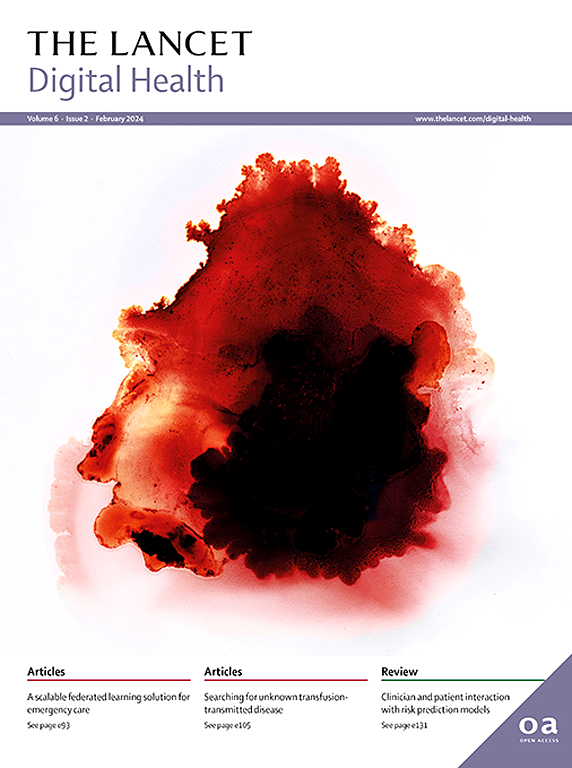在线视频与腹部大手术术前面对面咨询(视频):一项多中心、开放标签、随机、对照、非劣效性试验。
IF 23.8
1区 医学
Q1 MEDICAL INFORMATICS
引用次数: 0
摘要
背景:在2019冠状病毒病大流行期间,患者和卫生保健提供者之间的在线视频会诊迅速普及。然而,据我们所知,关于在线视频咨询和传统面对面咨询的患者满意度和信息回忆质量,没有高质量的比较证据。在要求最高的磋商中,这种证据的缺乏尤其令人关切。我们的目的是评估就患者满意度而言,腹部大手术前患者与外科医生之间的在线视频咨询是否不逊于面对面咨询,并评估对患者信息回忆的影响。方法:这项开放标签、随机、对照、非劣效性试验(video o)在荷兰的两家医院(一家是学术医院,一家是地区医院)进行。成年患者(年龄≥18岁)需要咨询外科医生讨论腹部大手术,并且能够并愿意通过在线视频和面对面咨询进行互动,符合纳入条件;如果患者不能或不愿意开始或维持在线视频咨询,则被排除在外。符合条件的患者被随机分配(1:1)进行在线视频或面对面咨询,由研究协调员使用计算机生成的,隐藏的,排列块随机化方法,不同块大小(2名,4名和6名患者),按研究地点分层。由于研究的性质,不可能掩盖患者和保健提供者。主要结局为患者满意度(0-100分;评估非劣效性(预先设定的差值为-10%)和信息召回(评分0-11),这两项均通过在线问卷进行评估,并在有结果数据的意向治疗人群中进行分析。技术不良事件在咨询后直接作为满意度问卷的一部分进行评估。该试验已在国际临床试验注册平台和涉及人类受试者的研究中央委员会注册,编号为NL-OMON20092,并已完成。研究结果:在2021年2月13日至2023年10月2日期间,120名患者被随机分配:60名患者进行在线视频咨询,60名患者进行面对面咨询。在线视频咨询组57例患者的结局数据可用(20例[35%]女性,37例[65%]男性;中位年龄64·0[55.4 ~ 72.5]岁),面对面组55例,其中女性22例[40%],男性33例[60%];中位年龄62岁[56岁~ 70岁]。在线视频咨询组的平均患者满意度得分为85.4分(SD为12.3),面对面咨询组的平均满意度得分为85.2分(14.2分)(平均差异为0.2,95% CI为- 4.8 ~ 5.1),均在-10%的非劣效范围内(pnon-劣效)。在腹部大手术的外科会诊中,使用在线视频会诊在患者满意度方面不低于面对面会诊,并且对信息回忆没有实质性影响。这些研究结果表明,在线视频会诊可以在外科门诊放心地实施。资助:荷兰卫生研究与发展组织。本文章由计算机程序翻译,如有差异,请以英文原文为准。
Online video versus face-to-face preoperative consultation for major abdominal surgery (VIDEOGO): a multicentre, open-label, randomised, controlled, non-inferiority trial
Background
Online video consultation between patients and health-care providers rapidly gained popularity during the COVID-19 pandemic. However, to our knowledge, there is no high-quality comparative evidence regarding patient satisfaction and quality of information recall with online video consultation and traditional face-to-face consultation. This lack of evidence is especially concerning in the most demanding consultations. We aimed to assess whether online video consultation between patients and surgeons before major abdominal surgery was non-inferior to face-to-face consultation in terms of patient satisfaction, and to assess effects on patient information recall.
Methods
This open-label, randomised, controlled, non-inferiority trial (VIDEOGO) was conducted at two hospitals (one academic and one regional) in the Netherlands. Adult patients (aged ≥18 years) who required consultation with a surgeon to discuss major abdominal surgery and were able and willing to interact via both online video and face-to-face consultation were eligible for inclusion; patients were excluded if they were unable or unwilling to start or maintain online video consultation. Eligible patients were randomly allocated (1:1) to online video or face-to-face consultation by the study coordinator, using a computer-generated, concealed, permuted-block randomisation method with varying block sizes (two, four, and six patients), stratified by study site. Masking of patients and health-care providers was not possible owing to the nature of the study. The primary outcomes were patient satisfaction (score 0–100; assessed for non-inferiority with a predefined margin of −10%) and information recall (score 0–11), both of which were assessed with online questionnaires and analysed in the intention-to-treat population for whom outcome data were available. Technical adverse events were assessed directly after the consultation as part of the satisfaction questionnaire. This trial is registered with the International Clinical Trial Registry Platform and the Central Committee on Research Involving Human Subjects registry, NL-OMON20092, and is complete.
Findings
Between Feb 13, 2021, and Oct 2, 2023, 120 patients were randomly assigned: 60 to online video consultation and 60 to face-to-face consultation. Outcome data were available for 57 patients in the online video consultation group (20 [35%] female and 37 [65%] male; median age 64·0 [54·5–72·5] years) and 55 patients in the face-to-face group (22 [40%] female and 33 [60%] male; median age 62·0 [56·0–70·0] years). The mean patient satisfaction score was 85·4 out of 100 (SD 12·3) in the online video consultation group and 85·2 (14·2) in the face-to-face group (mean difference 0·2, 95% CI −4·8 to 5·1), which was within the non-inferiority margin of −10% (pnon-inferiority<0·0001). The mean information recall score was 7·30 out of 11 (SD 1·60) in the online video consultation group and 7·25 (1·48) in the face-to-face group (mean difference 0·05, 95% CI −0·53 to 0·63). Technical adverse events occurred for two (7%) of 29 patients for whom data were available: one patient experienced a problem with the video connection and one experienced a problem with audio, both of which were resolved during the consultation without affecting the conversation.
Interpretation
The use of online video consultation during surgical consultation for major abdominal surgery was non-inferior to face-to-face consultation in terms of patient satisfaction and did not substantially affect information recall. These findings suggest that online video consultation can be implemented confidently in surgical outpatient clinics.
Funding
The Netherlands Organization for Health Research and Development.
求助全文
通过发布文献求助,成功后即可免费获取论文全文。
去求助
来源期刊

Lancet Digital Health
Multiple-
CiteScore
41.20
自引率
1.60%
发文量
232
审稿时长
13 weeks
期刊介绍:
The Lancet Digital Health publishes important, innovative, and practice-changing research on any topic connected with digital technology in clinical medicine, public health, and global health.
The journal’s open access content crosses subject boundaries, building bridges between health professionals and researchers.By bringing together the most important advances in this multidisciplinary field,The Lancet Digital Health is the most prominent publishing venue in digital health.
We publish a range of content types including Articles,Review, Comment, and Correspondence, contributing to promoting digital technologies in health practice worldwide.
 求助内容:
求助内容: 应助结果提醒方式:
应助结果提醒方式:


